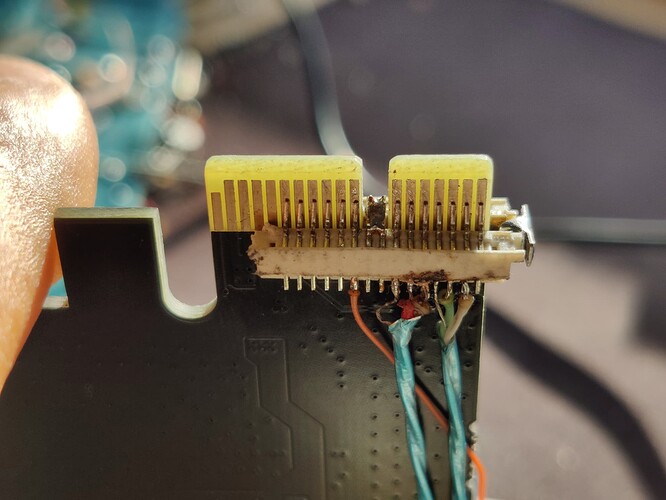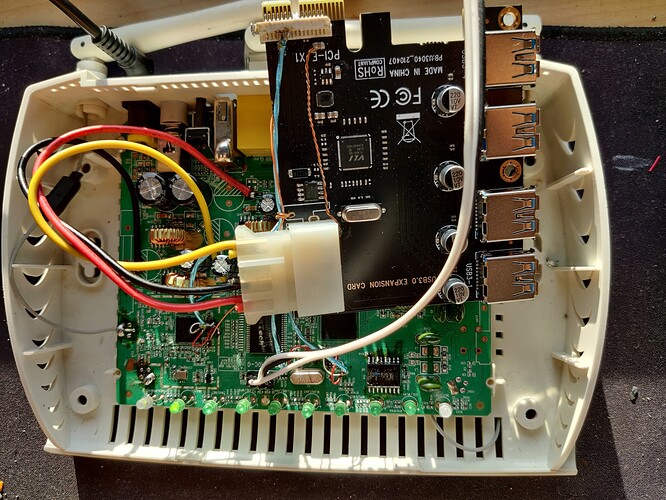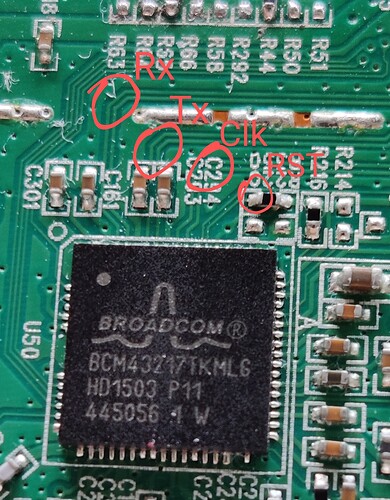Long story short: I don't use 2.4G for anything, so I thought on disconnecting the wlan controller and repurpose the pcie interface to connect a USB 3.0 board.
Before risking breaking the real hw, I used a useless comtrend ar-5315u.
Lifted the pcie pairs capacitors, breaking the connection with the wlan chip, then soldered the pcie lanes using shielded twisted pairs from an old HDMI cable, with same lengths to reduce skew:
- RefClk+, RefClk- (Reference clock)
- Tx+, Tx- (Transmit pair)
- Rx+, Rx- (Receive pair)
- PERST# (Reset signal)
- 3.3v, gnd etc
Ran:
opkg install kmod-usb-core kmod-usb-storage kmod-usb3 usbutils pciutils
Then the controller was detected, but gave error -145:
[ 18.006880] kmodloader: loading kernel modules from /etc/modules.d/*
[ 18.778222] xhci_hcd 0000:01:00.0: xHCI Host Controller
[ 18.783637] xhci_hcd 0000:01:00.0: new USB bus registered, assigned bus number 3
[ 28.791435] xhci_hcd 0000:01:00.0: can't setup: -145
[ 28.796526] xhci_hcd 0000:01:00.0: USB bus 3 deregistered
[ 28.802092] xhci_hcd 0000:01:00.0: init 0000:01:00.0 fail, -145
[ 28.808203] xhci_hcd: probe of 0000:01:00.0 failed with error -145
pciutils output shows the controller:
root@OpenWrt:# lspci
00:00.0 PCI bridge: Broadcom Inc. and subsidiaries Device 6318 (rev b0)
01:00.0 USB controller: VIA Technologies, Inc. VL805/806 xHCI USB 3.0 Controller (rev 01)
Memory dump:
root@OpenWrt:/# lspci -d 1106:3483 -xxx
01:00.0 USB controller: VIA Technologies, Inc. VL805/806 xHCI USB 3.0 Controller (rev 01)
00: 06 11 83 34 02 00 10 10 01 30 03 0c 04 00 00 00
10: 04 00 20 10 00 00 00 00 00 00 00 00 00 00 00 00
20: 00 00 00 00 00 00 00 00 00 00 00 00 06 11 83 34
30: 00 00 00 00 80 00 00 00 00 00 00 00 1f 01 00 00
40: 00 00 00 00 00 01 00 00 00 00 00 00 00 00 00 00
50: 00 36 01 00 00 00 00 00 00 00 00 00 06 11 83 34
60: 30 20 00 00 00 00 00 00 00 00 00 00 00 00 00 00
70: 00 00 00 00 00 00 00 00 00 00 00 00 00 00 00 00
80: 01 90 c3 f9 00 00 00 00 00 00 00 00 00 00 00 00
90: 05 c4 84 00 00 00 00 00 00 00 00 00 00 00 00 00
a0: 00 00 00 00 00 00 00 00 00 00 00 00 00 00 00 00
b0: 00 00 00 00 00 00 00 00 00 00 00 00 00 00 00 00
c0: 00 20 00 00 10 00 02 00 01 80 00 00 10 28 11 00
d0: 12 5c 06 00 00 00 11 10 00 00 00 00 00 00 00 00
e0: 00 00 00 00 00 00 00 00 12 00 00 00 00 00 00 00
f0: 00 00 00 00 22 00 01 00 00 00 00 00 00 00 00 00
Firmware revision:
root@OpenWrt:/# lspci -d 1106:3483 -xxx | awk '/^50:/ { print "VL805 FW version: " $5 $4 $3 $2 }'
VL805 FW version: 00013600
More info:
root@OpenWrt:/# lspci -d 1106:3483 -vvv
01:00.0 USB controller: VIA Technologies, Inc. VL805/806 xHCI USB 3.0 Controller (rev 01) (prog-if 30 [XHCI])
Subsystem: VIA Technologies, Inc. VL805/806 xHCI USB 3.0 Controller
Control: I/O- Mem+ BusMaster- SpecCycle- MemWINV- VGASnoop- ParErr- Stepping- SERR- FastB2B- DisINTx-
Status: Cap+ 66MHz- UDF- FastB2B- ParErr- DEVSEL=fast >TAbort- <TAbort+ <MAbort- >SERR- <PERR- INTx-
Interrupt: pin A routed to IRQ 31
Region 0: Memory at 10200000 (64-bit, non-prefetchable) [size=4K]
Capabilities: [80] Power Management version 3
Flags: PMEClk- DSI- D1- D2- AuxCurrent=375mA PME(D0+,D1+,D2+,D3hot+,D3cold+)
Status: D0 NoSoftRst- PME-Enable- DSel=0 DScale=0 PME-
Capabilities: [90] MSI: Enable- Count=1/4 Maskable- 64bit+
Address: 0000000000000000 Data: 0000
Capabilities: [c4] Express (v2) Endpoint, MSI 00
DevCap: MaxPayload 256 bytes, PhantFunc 0, Latency L0s <64ns, L1 <1us
ExtTag- AttnBtn- AttnInd- PwrInd- RBE+ FLReset- SlotPowerLimit 0W
DevCtl: CorrErr- NonFatalErr- FatalErr- UnsupReq-
RlxdOrd+ ExtTag- PhantFunc- AuxPwr- NoSnoop+
MaxPayload 128 bytes, MaxReadReq 512 bytes
DevSta: CorrErr+ NonFatalErr- FatalErr- UnsupReq- AuxPwr+ TransPend-
LnkCap: Port #0, Speed 5GT/s, Width x1, ASPM L0s L1, Exit Latency L0s <2us, L1 <16us
ClockPM+ Surprise- LLActRep- BwNot- ASPMOptComp-
LnkCtl: ASPM Disabled; RCB 64 bytes, Disabled- CommClk-
ExtSynch- ClockPM- AutWidDis- BWInt- AutBWInt-
LnkSta: Speed 2.5GT/s (downgraded), Width x1
TrErr- Train- SlotClk+ DLActive- BWMgmt- ABWMgmt-
DevCap2: Completion Timeout: Range B, TimeoutDis+ NROPrPrP- LTR-
10BitTagComp- 10BitTagReq- OBFF Not Supported, ExtFmt- EETLPPrefix-
EmergencyPowerReduction Not Supported, EmergencyPowerReductionInit-
FRS- TPHComp- ExtTPHComp-
AtomicOpsCap: 32bit- 64bit- 128bitCAS-
DevCtl2: Completion Timeout: 50us to 50ms, TimeoutDis- LTR- 10BitTagReq- OBFF Disabled,
AtomicOpsCtl: ReqEn-
LnkCtl2: Target Link Speed: 5GT/s, EnterCompliance- SpeedDis+
Transmit Margin: Normal Operating Range, EnterModifiedCompliance- ComplianceSOS-
Compliance Preset/De-emphasis: -6dB de-emphasis, 0dB preshoot
LnkSta2: Current De-emphasis Level: -3.5dB, EqualizationComplete- EqualizationPhase1-
EqualizationPhase2- EqualizationPhase3- LinkEqualizationRequest-
Retimer- 2Retimers- CrosslinkRes: unsupported
Capabilities: [100 v1] Advanced Error Reporting
UESta: DLP- SDES- TLP- FCP- CmpltTO- CmpltAbrt+ UnxCmplt- RxOF- MalfTLP- ECRC- UnsupReq- ACSViol-
UEMsk: DLP- SDES- TLP- FCP- CmpltTO- CmpltAbrt- UnxCmplt- RxOF- MalfTLP- ECRC- UnsupReq- ACSViol-
UESvrt: DLP+ SDES+ TLP- FCP+ CmpltTO- CmpltAbrt- UnxCmplt- RxOF+ MalfTLP+ ECRC- UnsupReq- ACSViol-
CESta: RxErr- BadTLP- BadDLLP- Rollover- Timeout- AdvNonFatalErr+
CEMsk: RxErr- BadTLP- BadDLLP- Rollover- Timeout- AdvNonFatalErr+
AERCap: First Error Pointer: 0f, ECRCGenCap- ECRCGenEn- ECRCChkCap- ECRCChkEn-
MultHdrRecCap- MultHdrRecEn- TLPPfxPres- HdrLogCap-
HeaderLog: 00000000 01000a00 00008040 0a000000
lspci: Unable to load libkmod resources: error -12
It seems the pci connection is correct, found same error happening for other routers (renesas-bases xhci controller), requiring a kernel patch and loading the firmware,but found nothing for VL805.
I'm planning to implement this on a WDR4900, has a powerful CPU, USB3 should give a huge boost in tranbsfer speeds, should work nicely as a NFS server.



